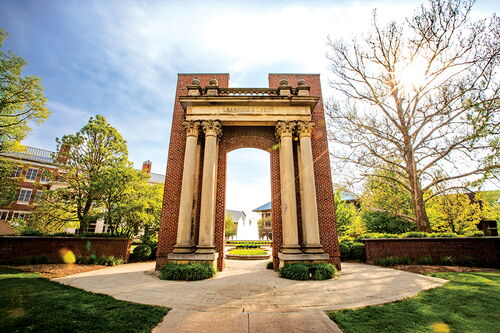Connecting the world
Turkey and Iran had been trying to connect their capitals by railroad since 1936, but the task was continually interrupted by war and other strife. As a result, the 1,500-mile railroad was still 350 miles short of being connected, even in the late 1950s. That's when Secretary of State John Dulles gave John McDonald (AB, '43, political science; JD, '46, law) the task of overseeing the completion of this railroad, a job that eventually put McDonald in charge of 10,000 people.
Making connections, whether it's a physical connection like a railroad or a political connection between two warring groups, has been the hallmark of Ambassador McDonald's career, a College of Liberal Arts & Science graduate and one of the recipients of the 2004 Alumni Achievement Award.
After graduating in political science from the University of Illinois in 1943 and then obtaining a law degree from U of I in 1946, McDonald found himself in the thick of the Cold War in post-war Berlin—emphasis on the word "cold." It was the coldest winter in 100 years in Berlin, but it also proved to be the ideal place for a young lawyer to learn the art of multi-lateral diplomacy.
McDonald wound up becoming district attorney for Frankfurt, Germany, teaching Germans the art of cross-examination by night and then facing his pupils in the courtroom the next day. McDonald even flew in the dramatic Berlin Airlift in 1948, in which Allied nations supplied relief packages to Germans cut off in Berlin by the Soviets.
From there, McDonald's colorful career carried him through some of the most important events in the post-war period. For example, he helped manage efforts in the Paris-based Marshall Plan, the ambitious effort to rebuild Japan and Europe. Then he moved into diplomatic posts in the Middle East, where he led an effort to set up a 3,000-mile line-of-sight microwave system—the backbone for a telephone system in remote parts of Turkey, Iran and Pakistan.
Among his many achievements, McDonald negotiated a couple billion dollars worth of food agreements with Egypt, managed a staff of 3,200 for the International Labor Organization in Geneva, Switzerland, was appointed ambassador twice each by Presidents Carter and Reagan, and was nominated for the Nobel Peace Prize in 1994. He also helped to direct the construction of 8,700 miles of farm-to-market roads in Kenya, wrote and edited eight books, and became president of the Iowa Peace Institute—the first statewide peace institute in the United States.
Somehow, he even found time to work as an amateur archeologist, and in Turkey in 1960 he discovered a room in an abandoned dig, where a British archaeologist later uncovered the oldest piece of cloth ever discovered.
But the common thread running through all of his experiences has been making connections—bringing people together. Even today, McDonald continues to connect people as director of the Institute for Multi-Track Diplomacy. He recently brought Kashmiris in India together with Kashmiris in Pakistan for the first time in 40 years. And his institute organized a soccer exchange between Libya and the United States.
"I'm an optimist," McDonald said. "I think every conflict in the world can be resolved peacefully. It takes time and patience and some money and skill, but it can be done."








